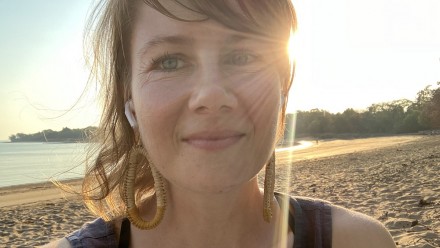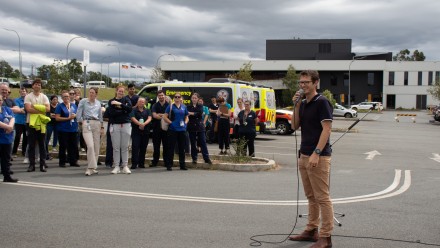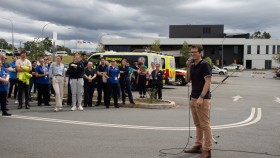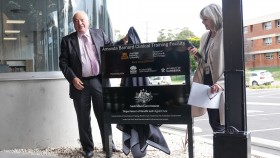An empathetic approach to care can be the best medicine
By Dr Ashwini Bennett
My name is Ashwini. I am a clinical and laboratory haematologist working a busy tertiary centre in Melbourne, Victoria. Outside of work I am also a wife, mother of two young children, sister, friend, and would-be-surfer. My family is of Sri Lankan background, and my four grandparents moved to Malaysia around the 1920s/1930s. Our family moved to Australia when I was 8 years old.
Growing up, I had always wanted to be a doctor, partly inspired by inspirational medical women in my family including my mother, my aunty, and several cousins. My mother developed ovarian cancer when I was a young child, passing away when I was a teenager, which had a profound impact on me. I also lost my father to cancer a few years ago. My experiences as a patient’s family member have helped to inform my practice as a doctor. I’m conscious that for me as a haematologist, certain situations may be very familiar, perhaps even something I have done literally hundreds of times before (e.g. discussing resuscitation status, working up a new cancer diagnosis, commencing chemotherapy, managing patients with DVT/PE). However for a given patient and their family, this may be their first time going through it, and they understandably can feel scared and overwhelmed, which calls for extra empathy and reassurance. Even in dark times, a smile, a kind word or gesture, or a shared laugh can go a long way.
I was on Haematology ward service for the month of March 2020. It was a period of very rapid change, from initial theoretical planning discussions about COVID to full measures being implemented within a couple of weeks. There were many challenges to consider and navigate in that first year, ranging from how to keep patients’ families updated about their loved ones when they were not allowed to visit them on our Haematology ward, the practical challenges of remote/virtual clinics (e.g. how to keep a toddler quiet long enough to allow me to run my telehealth clinics while working from home!), to wondering about the implications COVID would have on blood product supply for our vulnerable patient population.
Funnily enough, while the rest of the country was getting frantic about toilet paper, I was chasing study desks! I had initially deferred buying a home office desk (for my remote clinics) in March 2020 as I was busy with ward service. But then in April 2020, I found that all the furniture shops had completely sold out of desks! At one point, a friend texted me that one of her neighbours had put out a small kids’ desk on their nature strip, so I drove around straight away to get it, and used that for a while for my remote clinics!
As a doctor, I was grateful for stringent COVID policies as they helped to keep our patients safe and our hospitals from being overwhelmed. But on a personal level, they also presented many challenges, with 2 working parents trying to raise 2 young children, without the usual supports being available. For several months, my husband and I were doing a “tag team” effort to try and fit in all our work and home commitments, while also supervising a 5 year old with their online home schooling. That was a difficult period, with many early mornings and late nights.
As for the question of whether there was a silver lining, I might nominate two things. Firstly, in healthcare, it has made us a lot more conscious of infection control measures, many of which will continue to be useful even outside of a pandemic. Secondly, it was very inspirational observing how all my colleagues (including but not limited to doctors, nurses, lab scientists, allied health, admin, cleaning and other support staff) rallied together under very difficult and changing circumstances to keep up quality services as best as we could for the patients who entrusted us with their lives.










